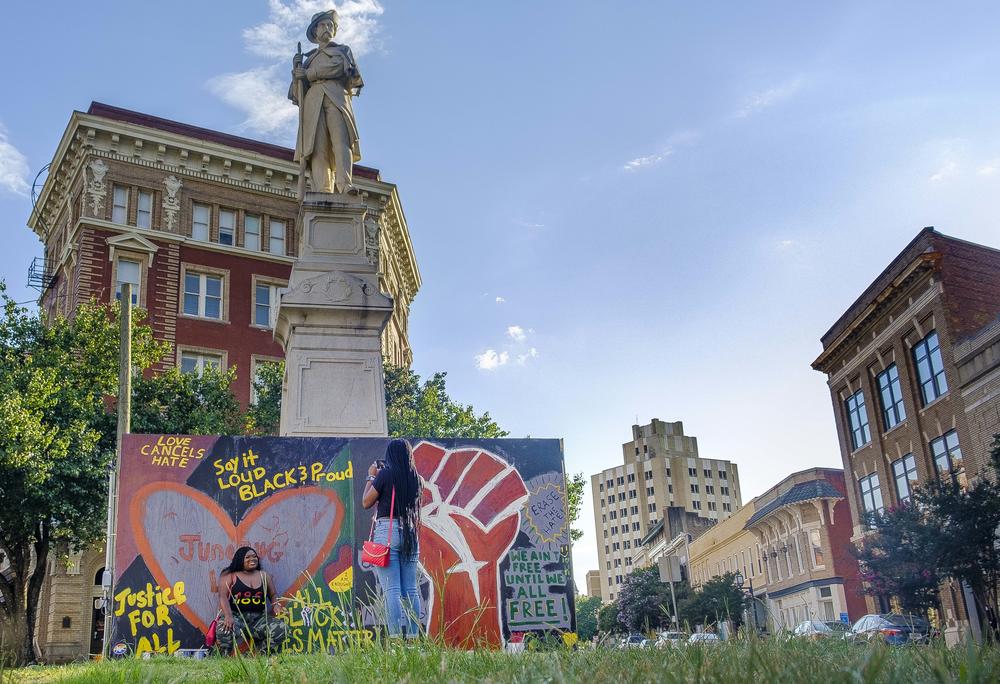We begin by catching up with this article out of New Orleans, Louisiana. “Robert E. Lee Day and Confederate Memorial Day will no longer be on the state’s calendar of official holidays after HB 248, authored by New Orleans Representative Matthew Willard, received final legislative approval. Alexandria Senator Jay Luneau carried the bill in the Senate and said we can remember the negative parts of history without celebrating them. ‘Removing these holidays would demonstrate that we refuse to commemorate, fondly remember, and celebrate the darkest times in our nation’s history,’ said Luneau. Critics of the bill argue that the holidays should stay on the books so as not to erase history. Luneau said that is no justification for disregarding the feelings of Black Louisianans and not placing those events in their proper perspective. ‘There is a way to commemorate history without glorifying the atrocities,’ he said. ‘We commemorate Victory Day, not the Nazis who drove us all into the World War. And we commemorate 9/11, not those who perpetrated the offenses on our nation.’ Also speaking in support of the bill was New Orleans Senator Joe Bouie, who said that this legislation can ultimately be another step towards dealing with the atrocities of the past and moving the state forward collectively. He said holidays are about celebration and unity, and Robert E. Lee Day and Confederate Memorial Day do not meet that standard. ‘We do have the opportunity to ensure that we won’t have a commemoration of a time in our development as a nation that excluded and used some of our citizens,’ said Bouie. The bill passed the House on a 74-19 final vote and now moves to the governor’s desk for his signature. Texas, Alabama, Mississippi, South Carolina, Georgia, Florida, North Carolina, and Tennessee all still have some form of Confederate Memorial Day on their books.”
Next we have this article from Georgia that reminds us how confederate heritage is inextricably linked to white supremacy, and any confederate heritage advocate should be regarded as a racist until proven otherwise. “A Georgia Civil War and Confederate memorabilia shop that closed down after the owner died has been reopened, WSB-TV reports. The reopening has prompted a local city councilman to resign and a local business owner to relocate. Wildman’s Civil War Surplus, which sells KKK merchandise and has a Confederate museum, is now being managed by Marjorie Lyon, who said the store has an ‘array of relics, artifacts, reference material. It’s not just on the Klan, it’s not just on the Confederacy.’ Kennesaw City Councilman James ‘Doc’ Eaton ‘got so fed up’ with the reopening that he resigned from his position, according to Fox 5 Atlanta. ‘They did it legal, but there was one main component they left out, the moral component. In this day and time it’s just not acceptable,’ said Eaton. As WSB-TV points out, a number of items in the store depict Black people in a derogatory way, ‘including balls of African American hair placed next to a box of picked cotton’ — items that Lyon says are just a joke. In regards to the other items in the store, Lyon says they’re just part of history. Cris Welsh, who is the owner of Eaton Chiropractic in Kennesaw, disagrees. ‘My husband always said if that were a strip club they would be handling this. What is in that building is more despicable than what would happen in a strip club. It’s disgusting,’ Welsh said. ‘If that business is going to stay… in my heart I can’t and I have spent 20 years on that corner,’ said Welsh.”
This article from Kentucky tells us, “The Kentucky Supreme Court has agreed to consider a lawsuit that seeks to re-erect a statue of a Louisville civic and military leader who fought for the Confederacy before later renouncing it. The statue of John B. Castelman was vandalized several times over a few years before it was removed in June 2020 from its pedestal near Louisville’s Cherokee Park, 107 years after it was erected, The Courier Journal reported. That followed a 2019 decision from Louisville’s landmarks commission that the monument could be taken down. It is currently in storage. The monument depicts Castleman riding a horse and wearing a suit and tie, not a military uniform. A group called Friends of Louisville Public Art filed a lawsuit challenging the landmarks commission ruling that allowed the statue to be removed. They argue the statue is a local landmark and claim several commission members should not have been allowed to vote because they have a conflict of interest. While the group acknowledges Castleman’s Confederate ties, they argue that he later renounced his allegiance to the Confederacy. Castleman later served as a brigadier general in the U.S. Army. He was partially responsible for establishing Louisville’s park system and fought to keep the city’s parks and playgrounds open to Black residents.”
The article also says, “Kentucky’s Court of Appeals upheld a Jefferson Circuit Court judge’s ruling dismissing the lawsuit. The appeals court ruled that there were ‘no facts to support the conflict of interests claim.’ In an order earlier this month, the state Supreme Court said it will review that ruling, a decision that has encouraged Friends of Louisville Public Art. ‘We’re very optimistic,’ Steve Wiser, who serves on the group’s executive committee, said in an email to the paper. Sarah Martin, the director of the Jefferson County Attorney’s Office Civil Division, told The Courier Journal in an email the office will file a brief in support of the statue’s removal.”

This article comes to us from Montgomery, Alabama. “Superintendent Ann Roy Moore said the statue of Confederate Gen. Robert E. Lee that was removed from in front its namesake high school in Montgomery was never returned because it was so damaged that they received an opinion from the Alabama Attorney General’s office that it did not have to be replaced at the May board meeting. In 2020, protesters toppled the statue during a night of protests across Montgomery in reaction to the George Floyd killing in Minnesota. After the statue was removed from its pedestal, it was taken from the scene, but later recovered. Normally, fines would have to be paid for its removal under the Alabama Memorial Preservation Act. The school district received a determination from Attorney General Steve Marshall that the statue was so damaged that they could give the statue to a third-party without violating the act.”

The article continues, “The letter states the statue would cost $80,000 to replace or $30,000 to repair based on an appraisal. Marshall writes that the city and the school board disagree about who owns the statue, but both groups are willing to release ownership of the statue to an interested third-party. MPS spokesperson Jade Jones said that the Sons of Confederate Veterans now have the statue. ‘The Sons of the Confederacy reached out to MPS, and they asked if they could have the statue as it is,’ said Jones. The Alabama chapter of the Sons of Confederate Veterans did not return a response to a request for an interview. The statue was given to the city of Montgomery in 1908 and relocated to the school in 1960, where it remained until Jun. 1, 2020. The MCBOE controls the public property where the statue is located but argues that the city owns the statue, according to the letter. Marshall writes that MPS did not violate the act as the damage was done by ‘independent criminal acts of third-parties,’ and the removal was because it was too damaged to be put back up on the pedestal. One provision of the act states that statues can be removed for emergency repairs but Marshall writes that this ’emergency repair provision’ would not apply as the extensive damage came from no fault of the Montgomery Board of Education. The statue has a history of vandalism, and the school has spent thousands of dollars over the years repairing the statue, according to ‘Echoes of Robert E. Lee High School,’ a book written in part by former MPS Superintendent Clinton Carter. ‘Recent estimates to replicate and replace the statue range from $45,00 in copper and bronze to $25,000 in aluminum,’ the 2015 book states.”

Credit: Grant Blankenship / GPB News
This article from Macon, Georgia, tells us, “A pair of monuments to the Confederacy in downtown Macon will be moved starting Wednesday morning. The first to go will be the soldier in the triangle where Macon’s Cotton Avenue slants into Second Street. It was the subject of a 2020 protest where a box built at the statue’s base was decked out in art inspired by the Movement for Black lives. The second is a monument to the mothers of Confederate war dead a few blocks away in a park on Poplar Street in view of Macon’s City Hall. Both monuments are being moved with the support of the Sons of Confederate Veterans and the Daughters of the Confederacy. No public money will be spent to move the monuments. Alex Morrison heads Macon’s Urban Development Authority which will guide the next step: turning the Cotton Avenue statue’s home into a public plaza. ‘We think this is a signature location to have a green space that really speaks to human connectivity and the community that Macon has become,’ Morrison said. Trey Wood has had a view of the back of the Confederate soldier’s head from the building and office he has owned for 37 years. He’s ready to see the monument go. ‘I recognize that this could be a contentious issue for some folks and it shouldn’t be,’ Wood said. ‘And besides that, it is affording an improvement right here in my front yard. So yeah, I’m all about it, man.’ Both statues will be moved just outside the entrance to Macon’s historic Rose Hill Cemetery where hundreds of Confederate soldiers’ graves are marked with headstones and where, in the Oakridge section of the cemetery, an untold number of the formerly enslaved rest unmarked.”

[…] Mackey at Student of the American Civil War looks at the effort in Louisiana to remove Confederate holidays from the state calendar. He also describes the new display of […]